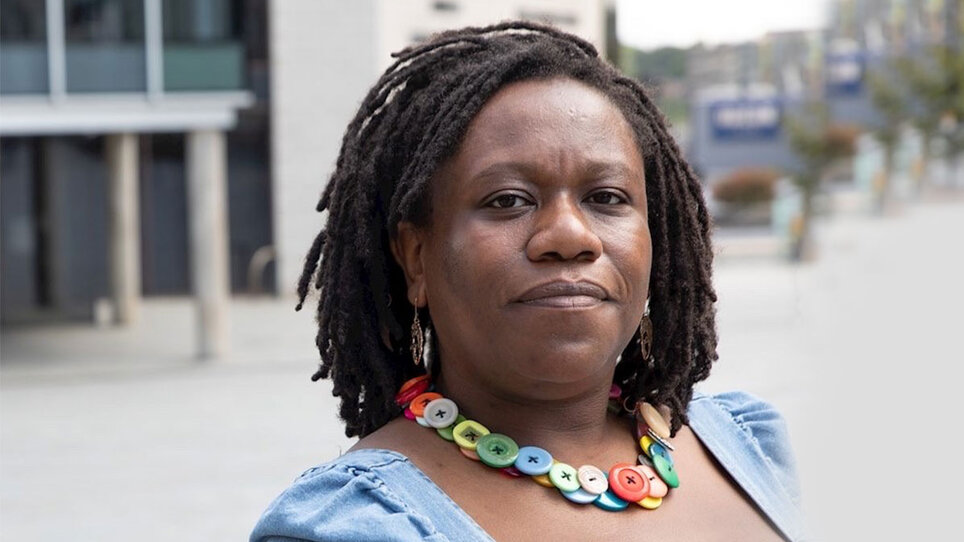
"Anyone delivering educational support needs to look beyond stereotypes and focus on the child in question."
Coral Bentley
- on educational support for Black autistic students
Celebrating Black History Month with...Coral Bentley
October is Black History Month, which celebrates the enormous contribution Black Britons have made to society. This is an important time to highlight Black autistic people’s stories – and the double discrimination so many face trying to get the right support and services.
We caught up with Coral Bentley, Senior College Support worker in Berkshire and parent to her 23-year-old autistic son. Coral chatted to us about the barriers she’s face getting the right support for her son, his experiences in and out of school, and what the Black Lives Matter movement means to her...
My son was diagnosed with Asperger syndrome at 15-years-old. As a child he was unsettled in school, I was often called in to discuss his behavior. The system began excluding my son from the age of five-years-old. The exclusions went on for years, until he reached secondary school. This resulted in my son having a checkered education. I was often back and forth to the schools attending meetings and I would frequently take it upon myself to make an appointment with the school to see how my son was progressing. During my son’s early years of education, I attended university, but was unable to complete my course due to the continuous disruption. I found it difficult to focus on my studies.
I decided to become a Parent Governor. I found being involved empowering in some way as my son and I were going through these issues. I gained an insight into how the school was managed. I was very interested in my children's education and wanted the best for them. I thought the best way to do this was to be involved in their education every step of the way.
I would regularly travel to London to attend conferences on ‘London Schools and the Black Child’ where Diane Abbott MP and other speakers would be addressing problems within the education system affecting Black pupils (particularly boys). Black students are more likely to be excluded than their white counterparts.
"I felt the need to surround myself with other parents facing similar experiences to me. I gained inspiration and also discovered some potential solutions."
I felt the need to surround myself with other parents facing similar experiences to me. I gained inspiration and also discovered some potential solutions.
During the transition from primary to secondary school the situation began to escalate. I continued to receive a disproportionate amount of negative feedback. Many different strategies were put in place, I felt some had unrealistic expectations that set my son up to fail. The interventions were not effective. In my opinion my son was not being viewed as an individual child with a unique set of needs and clearly equal opportunity policies and procedures were not being followed. While my son continued to struggle within the school environment he excelled in some lessons. He was performing very well in Art and English, as well as Design and Technology. His attainment was at a higher level than other students his age. Conversations had taken place about moving him up a class in Design and Technology but this was decided against due to behavior.
I was signposted and referred to Parenting Classes, but no one questioned the schools' approach. I attended so many meetings, I spoke to professionals for advice and guidance, I began to read literature on children with additional needs. I did so much to support my son. I knew my son needed more help and support than was being offered. From the school’s perspective, he was just 'a naughty child.' They kept excluding him. As a result, my son missed out on learning and social skills. He was becoming disheartened by this, but never refused to go to school. I eventually had enough. We both needed a break emotionally. I took my son out of the school system and placed him in an environment that was kinder to him. For a year, I home-tutored him. We joined a home-schooling group who were supportive of us. It gave him a break, and time away from all the meetings, and being told he was disruptive. During this time, we engaged with other agencies that were able to get the best out of my son by using a different approach, working style and incorporating best practice. They were able to identify my son’s particular needs.
After a year of being home schooled I felt my son needed to socialise more, so back he went to school. Unfortunately, things didn't change. The school wanted to send him to a Pupil Referral Unit (PRU), which I refused initially, I managed to arrange for one-to-one tuition for Maths and English at a different venue separate from the PRU. The tutors' feedback was always positive, there were never any issues. I had visited PRUs before as a Youth Worker, and I knew this wasn't suitable for my son and that it would have a negative impact on him. It was at this point I made the decision to involve a Special Education Solicitor as I knew my son’s wellbeing and education at the Pupil Referral Unit would go on a downward spiral.
Over the years, I had requested all my son’s reports, from his nursery, primary and secondary schools. The reports and the information I gathered were so useful. I proved to the local authority that my son’s issues had been present from nursery and what they put in place was in affective. I decided there was no point in sending him to schools in my local authority. It was time to investigate a different type of school. We needed to try something else. It was becoming clear to me that institutional bias was taking place. Staff are trained to identify symptoms or sign post and the fact this was not being recommended shows there was institutional bias taking place, based on my son’s disability or his race. I had records of my child's difficulties spanning over a decade. What more evidence was needed?
I named a school of our choice. We visited the school and we were both happy with the selection. I appointed a barrister who helped us to navigate through the legal process. Two weeks before the appeal I received a call from the local authority to say I had been given the independent residential school of our choice.
I had not seen my son smile the way he did for a long time after he heard the good news. This was the first time he felt empowered, this was the first time he was taught how to navigate his autism.
While my son was at the school, I arranged his work experience for him at an aviation facility. My son was able to go on a short haul-flights. He was being included, whereas before he was excluded from activities as he was considered a ‘risk’. My son passed his GCSEs and went on to college and successfully completed a BTEC course. The battle was hard but worth it, we got through it all in the end.

Coral's son during his work experience placement
In relation to Black Lives Matter, I have often thought: why didn’t my son and I get the help we needed? Was it due to the colour of our skin? Yes, I think this did play a part. Why was my son portrayed to be 'a disruptive child', rather than a child who needed additional support?
In speaking to other Black parents who have been through similar experiences many of them shared the same experience. Accessing the appropriate support for their child has been difficult. In contrast I found a higher number of white parents attending meetings. They had a forum to express themselves.
I don't really know why this is the case. Why is it that the correct information is not reaching Black parents of autistic children? Maybe Black parents have been put off by negative experiences in the education system. Most of the conversations I've had with Black parents about autism have taken place outside of organised meetings. Steps should be put in place to increase awareness and benefits of this type of support.
There is still a lot of work to take place within the education systems. I sometimes feel like Black children are set up to fail as soon as they enter education. I am aware that there are Black children that do achieve and do very well, but the exclusion rate of Black pupils I feel still remains high. If a child doesn't get the support they need, this can result in issues further down the line.
I believe Black children are more often than not, perceived as having behavioral problems. The focus tends to be on their actions rather than investigating why they are behaving in a certain way. I was told by a local authority representative that, 'in the cold light of day, you'll see your child can behave' - indicating that putting in place the resources and support for my child was wasting their time and money.
Every life matters. However, Black people have not been treated fairly historically in the education system. This needs to be recognised in order to make the necessary changes. In relation to special needs for the Black community I feel the support is both lacking and extremely slow. In my opinion, people in the education system, policy makers, governors and anyone delivering educational support needs to look beyond stereotypes and preconceptions and focus on the child in question.
"In my opinion, people in the education system, policy makers, governors and anyone delivering educational support needs to look beyond stereotypes and preconceptions and focus on the child in question."
Similar stories

"I sometimes feel that disability is treated as a secondary matter in society, and something needs to be done about this."
Judith Turkson-Baidoo
- on being a Black autistic woman and attitudes towards disability
Read more

"It is an honour to be born Black. Equally, it means that you will experience racism, prejudice and have to work twice as hard for half the acknowledgement."
Melissa Simmonds
- on why she is proud to be Black and autistic
Read more

The Spectrum magazine
Explore one of the UK's largest collections of autistic art, poetry, and prose. The Spectrum magazine is created by and for autistic people, and is available both online and in print.
Read the Spectrum





You are not alone
Join the community
Our online community is a place for autistic people and their families to meet like-minded people and share their experiences.
Join today